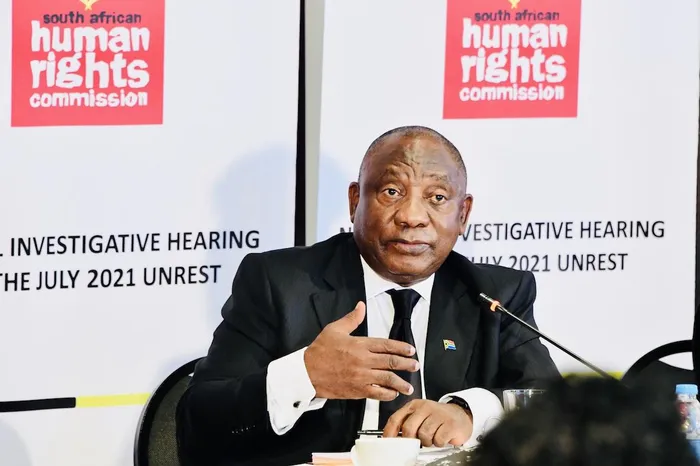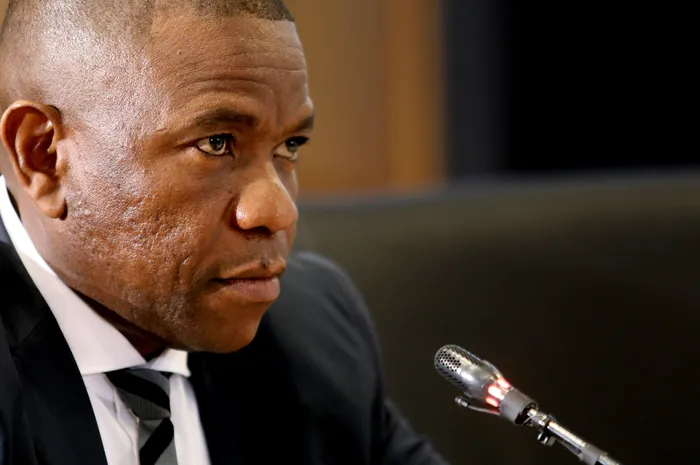Is Mkhwanazi a Reformer or a Risk to Institutional Integrity in South Africa?
MADLANGA COMMISSION

President Cyril Ramaphosa at the South African Human Rights Commission (SAHRC) National Investigative Hearing into the July 2021 unrest in KwaZulu-Natal and Gauteng held in Durban on April 1, 2022.
Image: AFP
Dr. Reneva Fourie
The unfolding work of the Madlanga Commission and the parallel parliamentary inquiry into the allegations of Lieutenant-General Nhlanhla Mkhwanazi are positioning him as one of the most prominent figures in South Africa’s current struggle for institutional integrity.
Mkhwanazi has placed fundamental issues of justice and governance, especially the intersection of politics, policing, business, and organised crime, on the national agenda. Yet, from the very start of this dramatic process, a careful observer is left with a lingering sense of unease, a quiet suspicion that the man who points so forcefully at the shadows may himself be standing in a penumbra of his own making.
Mkhwanazi's testimony before the Parliamentary ad hoc committee last week was detailed and serious. He portrayed senior officials within the police and state apparatus as actively undermining investigations, seizing intelligence resources, and illegitimately disbanding essential units like the Political Killings Task Team.
He accused parts of the prosecutorial service, intelligence community, and judiciary of corruption and undue influence, describing events such as the arrests of key investigators and targeted disciplinary actions as a coordinated effort to compromise probes into powerful syndicates. This suggests an instrumentalisation of the criminal justice system that constitutes state capture, warranting attention from both Parliament and a judicial commission.
However, Mkhwanazi’s presentation of evidence has raised important questions about consistency and transparency. He has made a series of gripping allegations, some of which have implicated highly placed officials and politically connected individuals.
Yet he frequently withholds corroborating detail, indicating that the information will be supplied in closed sessions or by witnesses still to appear. This pattern of partial disclosure sustains the drama of revelation but limits the public's and legislators' ability to verify the substance of his claims. For a figure whose moral authority rests on a demand for openness, such selectivity is difficult to reconcile.
In areas in the Western Cape, for example, communities are directly affected by extortion and gang violence. Many observers were looking forward to Mkhwanazi detailing how political parties, beneficiaries of public procurement, and criminal syndicates operate and manage to undermine the criminal justice system, but that detail has not been forthcoming.
His testimony has created expectations of exposure and clarity. Yet its follow-through has so far fallen short of the urgency felt by those living under criminal control.
There exists a disquieting dissonance in Mkhwanazi’s posture. As much as he chastises those who step outside their designated constitutional parameters, he appears to do so himself. Calling former liberation fighters who have integrated into the police service inexperienced is shocking, given their anti-apartheid sacrifices, foreign training, and extensive intelligence and security operations under impossible conditions.
Likewise, blaming them for the current problems is disingenuous, given that very few of the former non-statutory forces occupy top positions in the police.
His call for stronger auditing and oversight of crime intelligence funds has been broadly welcomed. Yet his handling of other aspects of intelligence, particularly surveillance and information control, has provoked unease. He has not clarified in the public domain whether the interceptions that they conducted complied with the strict legal processes governing these.
This failure to provide such assurance suggests operating in the grey areas of power, where the ends of fighting corruption might be used to justify means that, in turn, corrode the rule of law.
His disclosure that he once requested a temporary shutdown of social media accounts during the July 2021 unrest, justified on the grounds of public safety, raises a difficult question about where the limits of state power should lie.

KwaZulu Natal Police Commissioner Lt-Gen. Nhlanhla Mkhwanazi at the Madlanga Commission of Inquiry into Criminality, Political Interference, and Corruption in the Criminal Justice System.
Image: Independent Media
South Africa’s democratic settlement is built on a painful history in which freedom of speech was brutally crushed. Any suggestion of suppressing communication, even in moments of crisis, strikes a sensitive national nerve. The protection of freedom of expression, including through digital platforms, is not an inconvenience to law enforcement; it is one of the pillars that distinguish democracy from the authoritarianism of the past.
His remarks about the media have also added to this tension. In warning of what he described as captured journalists, Mkhwanazi sought to highlight how information can be manipulated to shield the powerful.
The underlying concern is valid, yet his language risked alienating independent journalists whose scrutiny is essential to democratic accountability. The same Constitution that empowers him to expose corruption also protects the press that examines his claims.
The larger question now hanging over Mkhwanazi’s interventions concerns his endgame. His allegations have sparked vital debates and prompted formal investigations. Yet it remains unclear whether his ultimate aim is institutional reform, personal vindication, or political positioning within an evolving security landscape.
His supporters view him as a principled reformer intent on cleansing a compromised system. His critics see a skilful tactician whose methods rely on selective disclosure and public performance. The truth may lie somewhere between these readings, but until he substantiates the claims that have shaken public confidence, the ambiguity will persist.
There is no disputing that Mkhwanazi has changed the national conversation. He has exposed the fragility of the state’s justice machinery and demanded that its custodians account for their actions.
His willingness to confront uncomfortable truths is rare and necessary. Yet the power of his testimony derives not only from its content but from the trust it commands. The credibility of his mission now depends on his willingness to provide evidence equal to the gravity of his words.
Ultimately, the true value of this moment does not lie in the actions of any individual but in the robust institutional processes that Mkhwanazi’s exposé has activated. The very existence of the Madlanga Commission and the parliamentary ad hoc committee represents a victory for constitutional democracy.
It demonstrates that even the most serious allegations against the most powerful figures can be subjected to formal scrutiny. It confirms that the fight against corruption cannot rely solely on personalities but must rest on due process, constitutional fidelity, and respect for the freedoms that define democratic life.
* Dr Reneva Fourie is a policy analyst specialising in governance, development, and security.
** The views expressed do not necessarily reflect the views of IOL, Independent Media or The African.